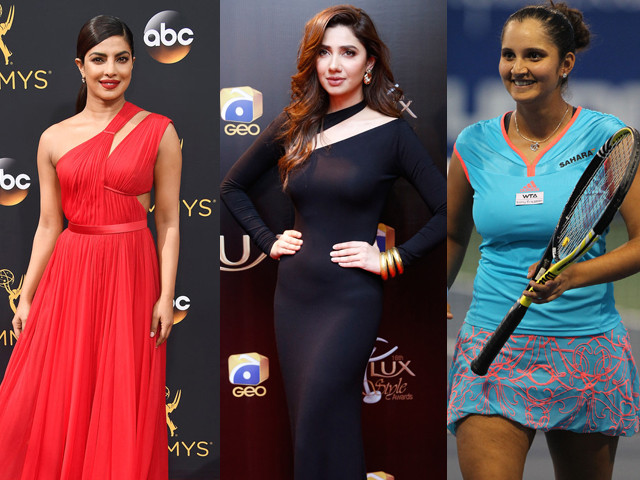I wholeheartedly believe in a woman’s right and choice to celebrate her looks, her body and her sexuality. But at the same time, it also sets me off when the media reduces a woman to merely that – just a pretty face.
At the trailer launch for her upcoming film, Mahira Khan was questioned by a few reporters regarding those controversial pictures with Ranbir Kapoor. Even though Mahira politely answered those questions, I was left baffled as to why the media would ask her such a personal question when she was there to promote her work.
She was not there in a personal capacity, nor was it an interview where it is permissible to ask questions of a more personal nature. But what seemed to be the priority of the reporters was to be the first to get the scoop, professionalism be damned. They did not seem to think it important to ask her about her character, if it’s different from any she has done before, or about the experience of working with an esteemed director like Shoaib Mansoor.
The preview of her upcoming film Verna shows Mahira beating the living daylights out of a man, but of course, the reporters didn’t find that of any value or interest. No, Mahira’s personal life was “better scoop”.
Asking famous women shallow or personal questions is both extremely sexist, and extremely common. Not just in Pakistan, but female celebrities all over the world are subjected to answering boring, superficial or intensely personal questions that men are simply not asked.
The instances are simply too many to number. Deepika Padukone was repeatedly asked how she worked with Ranbir Kapoor, her former boyfriend, instead of questions pertaining to her movie itself. Sunny Leone was asked by a journalist if he was being “morally corrupted” just because he was interviewing her.
Katrina Kaif was questioned more about her leaked bikini pictures than she was for movies she promoted.
Sexist questions aren’t even limited to Bollywood. While promoting Baywatch, Priyanka Chopra was frequently asked ‘intelligent’ questions like how she kept her focus with Dwayne Johnson around, and the size of her male co-stars' genitals.
Female athletes get the same third-rate treatment that is considered socially acceptable when it comes to women. Sania Mirza, after winning another title for her country, was asked when she planned on getting “settled” and having babies.
https://www.facebook.com/BuzzFeedIndia/videos/1650910341636113/
There have since been several video compilations of the kinds of questions women are subjected to and the result has me cringing and enraged at the same time, because all women get asked is,
“Who are you wearing?”
“What diet are you doing to lose weight?”
“What kind of underwear goes with this dress?”
 Photo: Giphy
Photo: Giphy Photo: Giphy
Photo: GiphyThis line of questioning sends the message that women are mere props in a show run by men – which is simply not true, as many female celebrities are now equally or even more famous than their male counterparts. Yet, female athletes are asked personal questions, about their parents, their family plans and their husbands, but male athletes are asked professional questions about their careers and their hopes for the future.
Women will be asked about how the men in their lives, be it their fathers of their husbands, have contributed to their success by “allowing” them to pursue their dreams, but men are not asked similar questions because it is given that a woman’s job is to be the support system. And if, in a rare instance, a man supports a woman’s pursuance of her career, that too dominates the conversation more than the achievements of the woman herself.
The times, however, they are a-changing. More and more female celebrities are now speaking up and calling out reporters who ask them sexist questions. Scarlett Johansson openly wondered why she was asked about her diet and how she got in shape while Robert Downey Jr was asked existential questions about playing a superhero.
 Photo: Tumblr
Photo: Tumblr Photo: Tumblr
Photo: TumblrAmerican actress Reese Witherspoon even started the #AskHerMore campaign before the 2015 Oscars, in an attempt to be asked questions other than,
“Who are you wearing tonight?”
Stop asking women questions about what they wear to cover the containers they carry their brains around in. #AskHerMore
— shonda rhimes (@shondarhimes) February 23, 2015
Ask her about the causes she supports, not her support garments #oscars #AskHerMore: http://t.co/RdjPR3k6pB
— Lena Dunham (@lenadunham) February 22, 2015
 Photo: Giphy
Photo: GiphyBollywood, which like most institutions is also inherently sexist, is also showing the first signs of change, thanks to its actresses who are gradually coming closer to the level of fame that has previously only been attained by men such as the Kapoors and the Khans in the industry.
Parineeti Chopra has on multiple occasions schooled reporters for being regressive and misogynistic; my personal favourite being the time she asked a male reporter covering a sanitary napkin event why he had such little knowledge about the female menstrual cycle, when he called a woman's monthly cycle her "problem".
 Photo: Giphy
Photo: GiphyThe captain of the Indian women's cricket team, Mithali Raj, was asked who her favourite male cricketer was. She responded,
“Do you ask the same question to a male cricketer?”
Increasingly, female celebrities feel more confident in opening up and sharing their thoughts with the media, and are hence shutting sexist questions down. But it’s still too ingrained as a norm for our industries, isn’t it? Why aren’t we changing the way we look at female celebrities? Why aren’t we asking them better questions?
In this day and age, cinema is thriving on gender role reversals and women are now more in the forefront than ever, are working just as hard, and in many cases are the sole crowd-pullers. To reduce such talented and successful individuals to merely the clothes they wear or the colour of their nail polish, simply because they happen to be women, is nothing less than regressive and archaic.



COMMENTS
Comments are moderated and generally will be posted if they are on-topic and not abusive.
For more information, please see our Comments FAQ